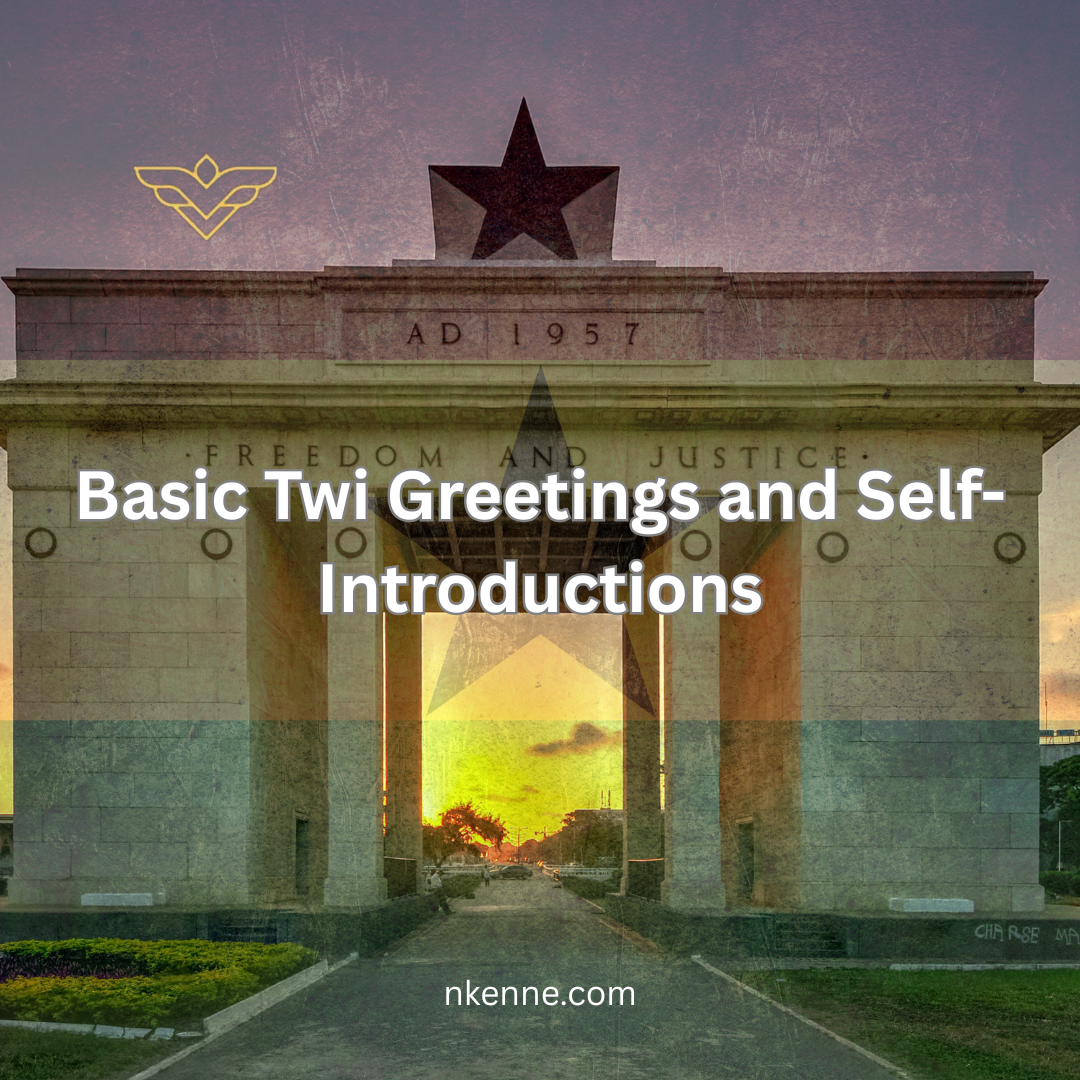Basic Twi Greetings and Self-Introductions
By: Chimdindu Ken-Anaukwu
If you’re learning Twi, greetings and introductions should be your first stop. Why? Because in Ghanaian culture, greetings aren’t just a formality—they’re a way of showing respect and building connections. Walking into a room without greeting properly? Big mistake. You might as well announce that you're an alien.
Today, we’ll go over the most essential Twi greetings and self-introduction phrases so you can start conversations with confidence.
1. Common Twi Greetings
| English | Twi | Pronunciation | Usage |
|---|---|---|---|
| Good morning | Mema wo akye | Meh-mah woh ah-chyeh | Used in the morning |
| Good afternoon | Mema wo aha | Meh-mah woh ah-ha | Used in the afternoon |
| Good evening | Mema wo adwo | Meh-mah woh ah-jwoh | Used in the evening/night |
| How are you? | Wo ho te sɛn? | Woh ho teh sen? | General greeting |
| I’m fine | Me ho yɛ | Meh ho yeh | Standard response |
| Thank you | Meda wo ase | Meh-dah woh ah-seh | Shows appreciation |
| Please | Mepa wo kyɛw | Meh-pah woh cheo | For politeness |
| Welcome | Akwaaba | Ah-kwah-bah | Used when welcoming someone |
💡 Tip: Twi greetings often involve a little small talk. If someone says Wo ho te sɛn? (How are you?), just saying Me ho yɛ (I’m fine) is acceptable, but if you want to impress, add Na wo nso ɛ? (And you?).
2. Introducing Yourself in Twi
Now that you’ve greeted properly, it’s time to introduce yourself. Here are key phrases:
| English | Twi | Pronunciation |
|---|---|---|
| My name is [name] | Me din de [name] | Meh din de [name] |
| I am from [place] | Me firi [place] | Meh free [place] |
| I live in [place] | Me te [place] | Meh teh [place] |
| Nice to meet you | Me ho ye wo | Meh ho yeh woh |
| What’s your name? | Wo din de sɛn? | Woh din de sen? |
Example Conversation
👤 You: Mema wo akye! (Good morning!)
👤 Local: Yaa nua! (Response to greeting.)
👤 You: Me din de Kofi. Na wo din de sɛn? (My name is Kofi. What’s your name?)
👤 Local: Me din de Ama. (My name is Ama.)
👤 You: Me ho yɛ. Wo nso ɛ? (I’m fine. And you?)
👤 Local: Me ho yɛ, medaase! (I’m fine, thank you!)
💡 Tip: If you’re introducing yourself in a formal setting, adding Mepa wo kyɛw (Please) makes you sound even more polite.
3. How to Address People in Twi
Respect is a big deal in Twi-speaking communities, so addressing people correctly is important.
| English | Twi | Pronunciation | Used For |
|---|---|---|---|
| Brother/sister (peer) | Nua | Noo-ah | Friends, age mates |
| Elder man | Opanyin | Oh-pah-neen | Elderly men |
| Elder woman | Aberewa | Ah-beh-reh-wah | Elderly women |
| Sir/Mr. | Owura | Oh-woo-rah | Formal respect |
| Madam/Mrs. | Awuraa | Ah-woo-rah | Formal respect for women |
4. FAQs
1. What happens if I forget to greet someone in Ghana?
Let’s just say… it’s not a good look. Greetings are a big part of Ghanaian culture, and skipping one might make you seem rude or unfriendly.
2. How do I know when to use “Yaa nua” or “Yaa agya”?
Use "Yaa nua" when responding to a greeting from a peer or friend.
Use "Yaa agya" when responding to an elder man.
Use "Yaa ena" when responding to an elder woman.
3. Can I just say “Hi” in Twi?
Twi doesn’t have a direct equivalent for “hi,” but a simple Ɛte sɛn? (How’s it going?) works just as well!
4. What’s the best way to practice Twi greetings?
Start greeting people in Twi! Even if you’re just greeting your mirror, practice makes perfect.
5. Can I introduce myself in English and mix in some Twi?
You can, but it’s better to use full Twi sentences when introducing yourself—it makes a great impression!
6. What if I mispronounce a word?
Ghanaians appreciate the effort! Even if you make a mistake, most people will happily correct you with a smile.
7. What’s the most impressive greeting I can use?
If you want to sound extra fluent, say Mema wo akye. Wo ho te sɛn? Me ho yɛ, meda wo ase! (Good morning! How are you? I’m fine, thank you!) That should earn you some nods of approval.
Final Thoughts
Now that you’ve got the basics, you’re ready to start greeting and introducing yourself like a local. Next time you meet a Twi speaker, don’t just wave—greet them properly and watch how quickly they warm up to you.
P.S. If someone says Mema wo akye and you panic, just smile and say Yaa nua! You’ll be just fine. 😉
